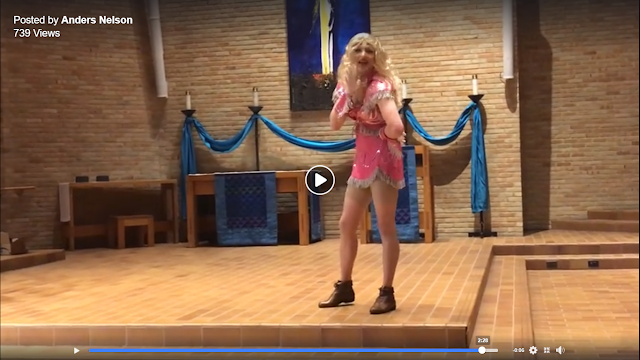Complete Sermon - First Sunday after Trinity, Luke 16:19-31. Examples of Unbelief and Faith. The Rich Man and Lazarus
PART III. QUESTIONS SUGGESTED AND ANSWERED.
21. This Gospel lesson suggests several questions. First, what is the bosom of Abraham, since it cannot be a natural bosom that is meant? To answer this, it is necessary to know that the soul or spirit of man has no rest or place where it may abide, except the Word of God, until he comes at the last day to the clear vision of God. Therefore we conclude that the bosom of Abraham signifies nothing else than the Word of God, where Christ was promised, Genesis 22:18, to Abraham, namely: “In thy seed shall all the nations of the earth be blessed.” In these words Christ is promised to him, as the one through whom every person shall be blessed, that is, shall be delivered from sin, death and hell, and through no one else and through no other work. All who have believed this passage, have believed on Christ, and have become good Christians, and have also through faith in this Word been released from sin, death and hell.
22. Thus were all the fathers before the birth of Christ carried into Abraham’s bosom; that is, at their death they were established in this saying of God, and they fell asleep in the same, they were embraced and guarded as in a bosom, and sleep there until the day of judgment; excepting those,. who have already risen with Christ, as Matthew 27:52 teaches, where they also remained. In like manner we, when we face death, must lay hold of and trust in the Word of Christ with strong faith, as John 11:26 says: “Whosoever believeth on me shall never die,” or like passages; and thus die in this faith, fall asleep, be embraced and guarded in the bosom of Abraham until the day of judgment. For the word spoken to Abraham and the word spoken to us is the very same word; both speak of Christ, that we must be saved through him. But the former is more particularly called Abraham’s bosom, because it was spoken first to Abraham and began with him.
23. Likewise on the other hand the hell here mentioned cannot be the true hell that will begin on the day of judgment. For the corpse of the rich man is without doubt not in hell, but buried in the earth; it must however be a place where the soul can be and has no peace, and it cannot be corporal.
Therefore it seems to me, this hell is the conscience, which is without faith and without the Word of God, in which the soul is buried and held until the day of judgment, when they are cast down body and soul into the true and real hell. For just as Abraham’s bosom is God’s Word, in which believers rest through faith, and fall asleep and are guarded there until the day of judgment; so must that on the contrary ever be hell, where God’s Word is not, into which the unbelievers are cast until the day of judgment. That can be nothing else than an empty, unbelieving, sinful, and evil conscience.
24. The second question is: How then did Abraham and the rich man converse with one another? Answer: It could not have been a conversation with the natural voice, since the bodies of both were lying in their graves; likewise as little was it the natural tongue that complained of being tormented; nor was it natural fingers and natural water that were desired from Lazarus. Therefore this all must be in the conscience thus: When the conscience is awakened by death or by the agonies of death, then it will have a testimony of its unbelief and will see then for the first time the bosom of Abraham, and those embraced by it, that is, the Word of God, in which it should have believed and did not; from which it has the very greatest pain and anxiety as in hell, and finds neither help nor consolation.
25. Then thoughts arise in the conscience, which held such a conversation, if they could speak, as this rich man did with Abraham, and seeks then whether the Word of God, and all who have believed in it, would help; and with so much anxiety that it would receive the least comfort from the very meanest of men, but even that cannot be granted to him. Then Abraham answered him, that is, his conscience took such a view of the Word of God, that it cannot be; but he had his portion of good things in his life, and he must now suffer; while the others are comforted, whom he despised.
26. At last he feels, that it is declared unto him: There is a great gulf fixed between him and the believers, that they will never be able to come together. These are the thoughts of despair, when the conscience feels that the Word of God is withdrawn forever from him; accordingly the thoughts of his conscience rage and would gladly have the living to know that such are the agonies of death, and he craves that someone would tell it to them.
But it is to no purpose; for he feels an answer in his own conscience, that Moses and the prophets are sufficient, whom they ought to believe, as he himself should have done. All such thoughts pass between the condemned conscience and the Word of God, in the hour of death or in the agonies of death; and no one can perceive what it is, except the one who experiences it; and he who experienced it wished that others should know it, but all is in vain.
27. The third question is: When did that take place, and if the rich man still daily without ceasing suffers thus until the day of judgment? That is a subtle question and not easily answered to the inexperienced. For here one must banish the idea of time from the mind and know that in the other world there is neither time nor hours, but all is an eternal moment or wink of the eye; as 2 Peter 3:8 says: “A day is with the Lord as a thousand years and a thousand years as one day,” Psalm 90:4. Therefore it seems to me that in this rich man we have an example of the future of all unbelievers, when their eyes are opened by death and its agonies; which can endure but for a moment and then cease until the day of judgment, as it may please God; for here no definite rule can be established. Therefore I dare not say that the rich man suffers still at present as he suffered at that time; and I dare not deny that he still suffers thus; for both depend upon the will of God. It is sufficient for us to know that his example and the beginning of the suffering of all unbelievers are here clearly set before us.
28. The fourth question is: Shall we pray for the dead; since here in the Gospel there is no intermediate state between Abraham’s bosom and hell, and those in Abraham’s bosom do not need it, and it does not help those in perdition. We have no command from God to pray for the dead; therefore no one sins by not praying for them; for what God does not bid or forbid us to do, in that no one can sin. Yet, on the other hand, since God has not permitted us to know, how it is with the souls of the departed and we must continue uninformed, as to how he deals with them, we will not and cannot restrain them, nor count it as sin, if they pray for the dead. For we are ever certain from the Gospel, that many have been raised from the dead, who, we must confess, did not receive nor did they have their final sentence; and likewise we are not assured of any other, that he has his final sentence.
29. Now since it is uncertain and no one knows, whether final judgment has been passed upon these souls, it is not sin if you pray for them; but in this way, that you let it rest in uncertainty and speak thus: Dear God, if the departed souls be in a state that they may yet be helped, then I pray that thou wouldst be gracious. And when you have thus prayed once or twice, then let it be sufficient and commend them unto God. For God has promised that when we pray to him for anything he would hear us.
Therefore when you have prayed once or twice, you should believe that your prayer is answered, and there let it rest, lest you tempt God and mistrust him.
30. But that we should institute masses, vigils and prayers to be repeated forever for the dead every year, as if God had not heard us the year before, is the work of Satan and is death itself, where God is mocked by unbelief, and such prayers are nothing but blasphemy of God. Therefore take warning and turn from these practices. God is not moved by these anniversary ceremonies, but by the prayer of the heart, of devotion and of faith; that will help the departed souls if anything will. Vigils, masses, indeed help the bellies of the priests, monks and nuns, but departed souls are not helped by them and God is thus mocked.
31. However, if you have in your house a spook or ghost, who pretends that the departed can be helped by saying masses, you should be fully persuaded that it is the work of Satan. No soul has yet since the beginning of the world reappeared on the earth, and it is not God’s will that it should be so. For here in this Gospel you see that Abraham declares that no one can be sent from the dead to teach the living; but he points them to the Word of God in the Scriptures, Deuteronomy 31: “They have Moses and the Prophets; let them hear them.” By these words Abraham turns to the command of God in Deuteronomy 18:11, where God says: “Thou shalt not be a consulter with a familiar spirit.” Isaiah 8:19. Therefore it is surely nothing but the contrivance of Satan that any spirits should let themselves be entreated and that they should require so and so many masses, such and such pilgrimages or other works, and appear afterwards in the clear light and pretend that certain persons are saved. In this way Satan has introduced error so that the people have fallen from faith into works, and think their deeds may accomplish such great things. And thus is fulfilled what St. Paul declared in 2 Thessalonians 2:10-11, that God would send upon them powerful error, and temptation to unrighteousness, because they have not received the love of the truth that they might be saved.











.jpg)










.jpg)




